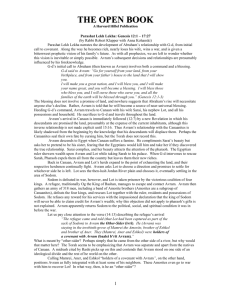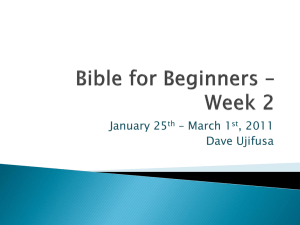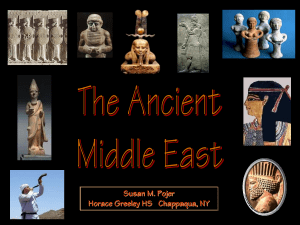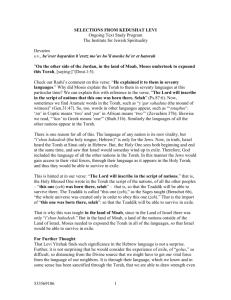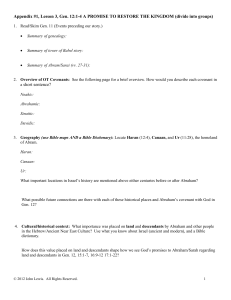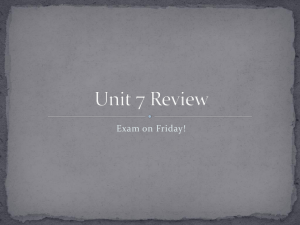Parshat Lekh-L`kha (11/1/14)
advertisement
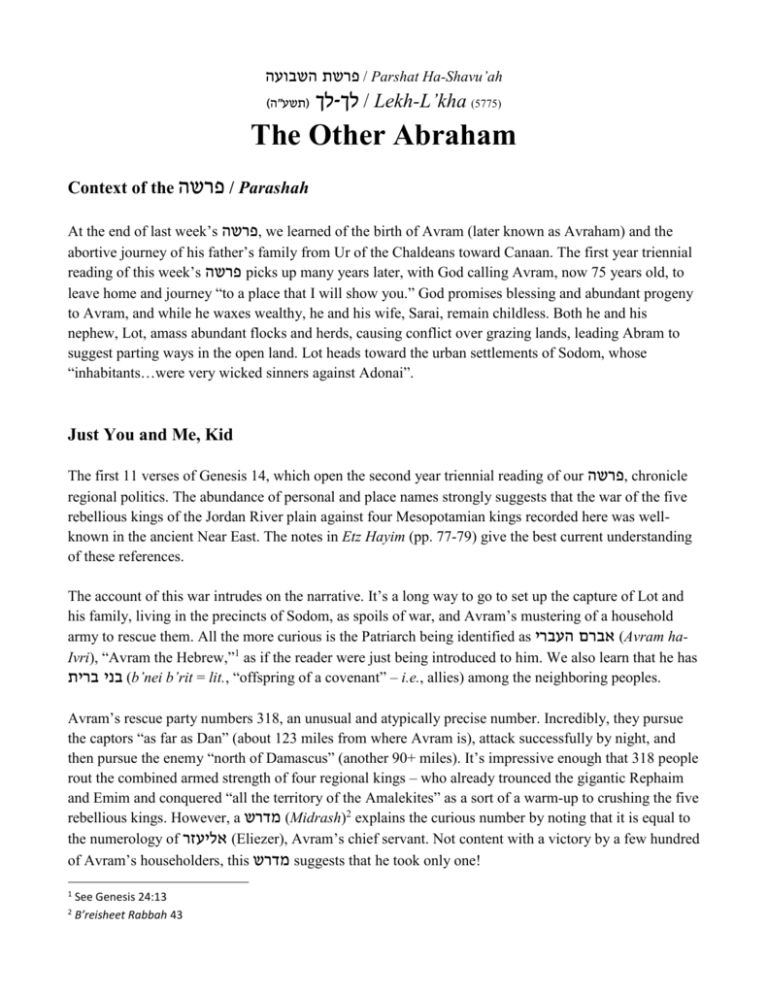
פרשת השבועה/ Parshat Ha-Shavu’ah )(תשע"ה לך- לך/ Lekh-L’kha (5775) The Other Abraham Context of the פרשה/ Parashah At the end of last week’s פרשה, we learned of the birth of Avram (later known as Avraham) and the abortive journey of his father’s family from Ur of the Chaldeans toward Canaan. The first year triennial reading of this week’s פרשהpicks up many years later, with God calling Avram, now 75 years old, to leave home and journey “to a place that I will show you.” God promises blessing and abundant progeny to Avram, and while he waxes wealthy, he and his wife, Sarai, remain childless. Both he and his nephew, Lot, amass abundant flocks and herds, causing conflict over grazing lands, leading Abram to suggest parting ways in the open land. Lot heads toward the urban settlements of Sodom, whose “inhabitants…were very wicked sinners against Adonai”. Just You and Me, Kid The first 11 verses of Genesis 14, which open the second year triennial reading of our פרשה, chronicle regional politics. The abundance of personal and place names strongly suggests that the war of the five rebellious kings of the Jordan River plain against four Mesopotamian kings recorded here was wellknown in the ancient Near East. The notes in Etz Hayim (pp. 77-79) give the best current understanding of these references. The account of this war intrudes on the narrative. It’s a long way to go to set up the capture of Lot and his family, living in the precincts of Sodom, as spoils of war, and Avram’s mustering of a household army to rescue them. All the more curious is the Patriarch being identified as ( אברם העבריAvram haIvri), “Avram the Hebrew,”1 as if the reader were just being introduced to him. We also learn that he has ( בני בריתb’nei b’rit = lit., “offspring of a covenant” – i.e., allies) among the neighboring peoples. Avram’s rescue party numbers 318, an unusual and atypically precise number. Incredibly, they pursue the captors “as far as Dan” (about 123 miles from where Avram is), attack successfully by night, and then pursue the enemy “north of Damascus” (another 90+ miles). It’s impressive enough that 318 people rout the combined armed strength of four regional kings – who already trounced the gigantic Rephaim and Emim and conquered “all the territory of the Amalekites” as a sort of a warm-up to crushing the five rebellious kings. However, a ( מדרשMidrash)2 explains the curious number by noting that it is equal to the numerology of ( אליעזרEliezer), Avram’s chief servant. Not content with a victory by a few hundred of Avram’s householders, this מדרשsuggests that he took only one! 1 2 See Genesis 24:13 B’reisheet Rabbah 43 Victory is Thine Upon his victorious return, Avram has more politics to deal with. The king of Sodom, presumably restored to sovereignty by Avram’s intervention, comes out to greet him in the field. And a previously unnamed king, צדק-( מלכיMalki-tzedek [Melchizedek] – “my king is just”), who is also “a priest of the God Most High,” brings bread and wine, blessing “Avram of God Most High, Creator of heaven and earth” and “God Most High, Who has delivered your foes into your hand.” As was customary3, Avram gives a tithe of the spoils of war. The king of Sodom then attempts to strike a different deal: “Give me the persons [Heb., ( הנפשha-nefesh) – lit., “the soul(s)”], and take the possessions for yourself.” Avram’s refusal of the king of Sodom’s offer stands as a model attribute for Jews: “I swear by the God Most High, Creator of heaven and earth,” he says, “I will not take so much as a thread or a sandal strap of what it yours; you shall not say, ‘It is I who made Avram rich.’” There are many layers to this reply (note, for example, that he uses the same name and metaphor for God as Melchitzedek, language which will make its way into the opening paragraph of the [ עמידהAmidah], the central prayer in Jewish liturgy). At its core, however, is something beyond material wealth4. The whole reason for Avram’s military expedition was to rescue “the persons” from his clan. The king of Sodom attempts to obtain by financial bargaining what Avram would not allow the five rival kings to take and keep by force of arms. Let’s Bake a Deal In a ( פרשהparashah) loaded with unusual and even troubling events, perhaps the strangest is ברית בין ( הבתריםb’rit bein ha-b’tarim = “the covenant between the pieces”). Asking for a sign of God’s promise that he will have abundant progeny and inherit the land (especially seeing as he has no children as yet), Avram has a vision in which God instructs him to sacrifice a number of animals, cut some in half, and arrange the halves opposite one another. Avram falls into a stupor and God appears in a dream, reiterating the promise and passing between the pieces, represented by “a smoking oven and a flaming torch.” This reflects common practice in the ancient Near East, where a covenant would be made by splitting an animal and the parties walking between the pieces.5 That would be strange enough by itself. But there’s more! Centuries later, God tells Moses at the burning bush that God did not reveal God’s proper Hebrew name (the Tetragrammaton) to earlier generations. Yet Avram addresses God by that Name here, and God uses it as well. In another link to Moses, God reveals that Avram’s promised (but, so far, hypothetical) descendants “shall be strangers in a land not theirs [and] enslaved [for] four hundred years; but I will execute judgment [and] in the end they shall go free with great wealth.” This passage is crucial to so-called Liberation Theology, which emerged initially among African slaves in the pre-Civil War United States. 3 See note on “gave him a tenth” in Etz Hayim, p. 81 Rabbinic sources put a theological spin on Avram’s refusal to take “a thread or a sandal strap.” When he pointedly says that the king will not be able to claim to have made him rich, he is really saying it is God who blesses with prosperity. 5 The phrase in the Torah, including for the Covenant at Sinai, is ( כורת בריתkoreit b’rit) – literally, “cut a covenant” 4 Reflections on the ( פרשהParshah) The phrase, “Promised Land6,” does not actually appear as such in the ( תנ"ךTana”kh = Hebrew Bible). However, the concept is clearly articulated in the Torah, beginning with Leviticus 25:18-19, and reiterated in the Prophets several times. The Hebrew reflects the notion of security and trust, and the truthfulness of God’s assurance. Even without these specific assurances, however, the Torah is rife with references to God’s intention to give Canaan to the Israelites “to possess as an inheritance throughout your generations.” Yet even this clear-cut and repeated statement is not without its ambiguities. In our פרשהand elsewhere, God promises Canaan to Abraham and his progeny. Elsewhere, the Torah notes that Ishmael – Abraham’s son by Sarah’s handmaid, Hagar, and, according to the Qur’an, the spiritual ancestor of Islam – is considered Abraham’s progeny as much as Isaac. Following what will become the pattern in the תנ"ך, the Torah assigns spiritual inheritance to the younger rather than the eldest son, bypassing Ishmael and tracing the promise to Isaac and then Jacob. Jacob is renamed Israel, a name which is simultaneously that of the individual, the people descended from him, and the land. A further complication is defining what exactly constitutes Canaan and/or the Promised Land. In this morning’s ( פרשהparashah), the boundaries extend from Lebanon in the north to a line roughly parallel to but significantly farther south than that of the current state of Israel. Elsewhere in the Hebrew Bible, the cited borders may include Damascus or the trans-Jordan, or may be limited to the space between the Jordan River and the Mediterranean Sea, and Mt. Hermon and the southern tip of the Dead Sea. King David and King Solomon will extend and consolidate Israelite power in the region, extending the borders of their empire. In the centuries which follow, there will be civil war, foreign invasion and conquest, and exile. Both archeological and historical records are unequivocal, though, in establishing that there has been an ongoing Israelite – and, later, Jewish – presence in the region since antiquity. It may be all but impossible to define “Biblical Israel,” but it is entirely possible to document Israelite / Jewish occupancy in the land of Israel since Biblical times. The adventures of our father, Abraham, in this week’s Torah-reading are, in many ways, outliers compared to the rest of his experiences. Most of the rest of his experiences, as recorded in the Torah, are associated with family life. Here, he is more of what Rabbi Joseph Soloveitchik described as “the lonely man of faith,” acting alone (although often on behalf of his family). Abraham’s loneliness culminates in the ( ברית בין הבתריםb’rit bein ha-b’tarim – see Let’s Bake a Deal above), in which his personal pain and doubt are laid out for all to see. God’s compassionate response is to reiterate the promises of progeny and land once more. Abraham’s deepest fear is that he has no legacy. God reminds him that his legacy will be, in many ways, greater and more influential than any other person in human history. 6 Hebrew: ( ארץ מובטחתeretz muv’taḥat) הפטרה/ Haftarah – Isaiah 40:27-41:16 Context of the story: That the later chapters (Chapter 40 and onward) of the book of Isaiah are the work of a later author has been recognized and accepted in mainstream Judaism since at least medieval times. Not only does the literary tone and language change noticeably, but so-called Second Isaiah (or Deutero-Isaiah) references people, places, and events beyond the lifetime of the prophet Isaiah in ways which assume the reader is familiar with them. In other words, we cannot simply say that these later chapters are Isaiah engaging in the sort of clairvoyance popularly associated with the concept of “prophecy.” The prophets of the Hebrew Bible are not fore-tellers, but “forth-tellers”. Their divinely-decreed assignment is not to predict (or reveal) the future, but to speak truth to the people and to those in power. Events of the Haftarah The prophet speaks to the Israelites in the Babylonian Exile (6th century BCE), and assures them that redemption and return are at hand. God has “roused a victor from the East [and] summoned him to God’s service” – a reference which the 12th-century Spanish commentator, Abraham ibn Ezra interprets as meaning Cyrus the Mede, the Persian emperor who conquered Babylon and who decreed that the Israelites may return to Jerusalem and rebuild their Temple.7 Throughout these assurances, the repeating phrase is ( אל תיראal tira) – “Do not be afraid”. Reflections on the הפטרה God’s reassurance that Jacob (Israel) should not fear, but should “take courage” is founded on the premise that God, “who is the first and will be the last as well,” is unrivaled in sovereignty such that “the coastlands look on in fear” and “the ends of earth tremble.” The frequent theme of the Hebrew Bible – that God as Author of Creation is also capable of directing all aspects of Creation to God’s will – is employed here as a reminder that human agency is under divine scrutiny at all times. It’s not that Israel – or any nation of human beings – need not fear as a result of its own might. Rather, despite being compared in power to a worm, Jacob / Israel should not fear because God has promised protection and perpetuation of the people. God does not forget God’s promises, even though there may be generation (or more) which does not prosper or even suffers. Israel is still “the seed of Abraham, My beloved one,” and the covenant with him – and his descendants – remains intact. (Rabbi David Kay – 1 November 2014) 7 Cyrus is mentioned explicitly, a few chapters later: Thus said Adonai to Cyrus, God’s anointed one – whose right hand God has grasped, treading down nations before him… [Isaiah 45:1] Our הפטרהechoes this language (see 41:13).
